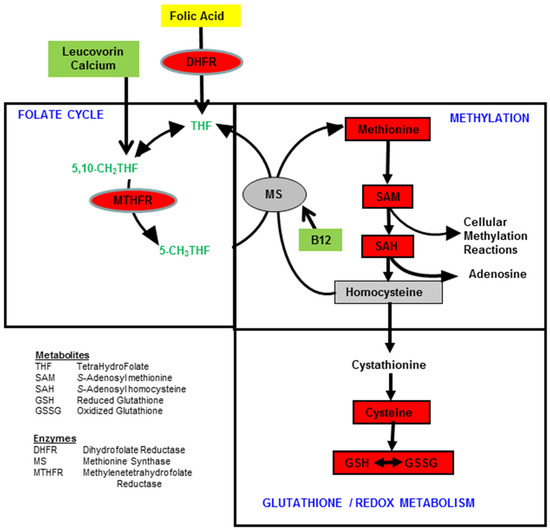Is a Folate Deficiency Worsening Your Child’s Autism?
- Home
- Blog

Autism is a complex medical diagnosis with only two FDA-approved medications. The approved medications do not treat the core symptoms of autism but rather disruptive behavior. In fact, there is no approved medication to address the root causes of autism. However, a recent meta-analysis showed that many patients with ASD have cerebral folate deficiency. This finding could have significant implications on the future of autism treatment. Here’s what you will learn in this blog:
- How is autism treated?
- What is folate?
- Could treating a folate deficiency help your child’s autism symptoms?
- Using the FRAT test to determine folate deficiency
How is Autism Treated?
Autism Spectrum Disorder (ASD) is a developmental disability that typically involves difficulty with back-and-forth interactions and restrictive repetitive behaviors. ASD requires extensive therapy to address many different behaviors or delays such as applied behavior analysis therapy, speech therapy, and occupational therapy. At this time there are a limited number of medicines available to treat the symptoms of ASD, and they usually only address one issue and not all of the core symptoms. Another issue with the medications available is that they often have side effects or aren’t feasible in young children.
That said, in light of recent studies, the way autism is treated could be advancing in exciting new directions. A recent meta-analysis found that 70% of patients with ASD have an antibody in their blood that interferes with folate receptor alpha and has been associated with cerebral folate deficiency, a neurological disorder that involves low folate availability in the brain. Affected children start to lose mental and motor skills due to this lack of folate.
Could treating this disorder help children with autism? Let’s dig in to find out more.
What is Folate?
Folate is a water soluble vitamin (B9) that is essential for DNA synthesis and repair, myelination (e.g. insulation around neurons), and production of neurotransmitters such as serotonin. These processes are essential for a healthy brain. Our DNA, which provides the instructions to our neurons, can become damaged and is consistently being repaired. Without an accurate genetic code from our DNA, neurons will not have the proper instruction to work.
The wires in the brain, known as the axons, are wrapped in an insulation called myelin which is required for these axons to transmit information. Neurons communicate by sending chemicals called neurotransmitters from one neuron to another. Without neurotransmitters, neurons in the brain cannot communicate. In other words, folate is critical for normal brain functioning.
We typically get folate through our diet—through foods like broccoli, eggs, legumes, and leafy greens—and most people have no issues transporting it across the blood brain barrier. The image below shows how this works in closer detail—and how one drug, leucovorin, could aid in helping this process.

(Image from Rossignol, D.A.; Frye, R.E. The Effectiveness of Cobalamin (B12) Treatment for Autism Spectrum Disorder: A Systematic Review and Meta-Analysis. J. Pers. Med. 2021, 11, 784. https://doi.org/10.3390/jpm11080784 with permission under terms and conditions of the Creative Commons Attribution license.)
Could Treating a Folate Deficiency Help Your Child’s Autism Symptoms?
Leucovorin (aka Folinic acid) is a reduced form of folate that has the same vitamin activity and is available in the United States. Leucovorin is commonly used to address the adverse side effects of chemotherapy medications that combat cancer by targeting the folate cycle. Folinic acid is generally well tolerated and has an excellent safety profile.
In children with autoantibodies that bind to the receptor used to transport folate into the brain, leucovorin is able to use a secondary mechanism to transport across the blood brain barrier. This second mechanism for reduced folate transport requires high serum concentrations to work effectively and is not affected by these autoantibodies.
Leucovorin is able to cross the blood brain barrier and replenish a deficiency of folate in the brain. Restoring the levels of folate to the brain will allow vital biological processes to resume. Folate dependent processes include DNA synthesis, conversion of homocysteine to cysteine (a vital antioxidant), and creation of neurotransmitters (such as serotonin and dopamine).
Scientific Support for Leucovorin in Treating Autism
Dr. Frye is a child neurologist who has been working on treating children with ASD with leucovorin for over 10 years. During that time, he has published two pivotal studies which provide support for this treatment and is currently conducting several multicenter randomized controlled trials to further investigate the use of leucovorin in children with ASD.
Working with Dr. Edward Quadros at SUNY Downstate and Dr. Daniel Rossignol from the Rossignol Medical Center, Dr. Frye published the first clinical study demonstrating that children with ASD and the folate receptor alpha autoantibody treated with leucovorin in an open label fashion (families knew that the children were getting active drug) showed significant improvements in language, attention, and stereotyped behavior with few reported adverse effects. This study demonstrated that the concentrations of folate in the cerebrospinal fluid of patients was inversely proportional to the titers of the folate receptor alpha autoantibody.
In the second follow-up study, Dr. Frye found that leucovorin was effective when testing in a clinical trial with more rigorous methodology where the families didn’t know if the children were receiving a placebo as compared to the active leucovorin drug. These studies demonstrated that the folate receptor alpha autoantibody predicted which patients would respond to the leucovorin treatment. As described in the recent meta-analysis mentioned earlier, leucovorin has been found to be effect for the treatment of ASD in these and other studies.
Using the FRAT Test to Determine Folate Deficiency
There is now a test offered by Iliad Neurosciences called the Folate Receptor Autoantibody Test (FRAT). The FRAT can detect if a patient has antibodies for the folate receptor alpha. Physicians can order a test kit to be sent to a patient. The test requires a blood sample, and families can inquire about phlebotomy services in their area to draw the sample. Blood samples can be returned in the same kit, which includes an ice pack to preserve the test. Results are usually available after two to three weeks.
The following insight comes from Dr. Frye himself:
“Since there are no symptoms that appear to be specific for a child with ASD having the folate receptor alpha autoantibody in the blood, in my practice, all patients with ASD are screened with the FRAT. Those that are positive for either of the two autoantibodies detected by the FRAT are treated with leucovorin by slowly increasing the dose over two to four weeks. In our clinical trials we have found improvements in many symptoms, most pronounced language, but also disruptive behavior, within three to four months. Many children continue treatment for years. Some children lose the gains initially seen if the leucovorin is weaned. Some demonstrate some hyperactivity initially, but this is transient when it occurs and actually gets better than before the treatment within about six weeks. The commercial form of leucovorin contains a very small amount of lactose, so some children that are very sensitive to lactose require the leucovorin to be compounded.”
---
If you would like to find out more about how the FRAT test and leucovorin can help your child with autism, our doctors at Potomac Psychiatry can help. Contact us for more information, or to make an appointment.
.png?width=144&height=144&name=Untitled%20design%20(34).png)



